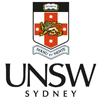Bachelor of Engineering (Honours) (Materials Science and Engineering)/Master of Biomedical Engineering
UNSW
CRICOS provider number: 00098G TEQSA provider ID: PRV12055
Courses included
This course has been cancelled
About
If you're passionate about biomedical engineering and want to build a career in this field, this double degree is ideal for you. It combines the technical knowledge of Materials Science and Engineering with specialised postgraduate training in Biomedical Engineering.
The Materials Science and Engineering component focuses on studying the structure, properties and performance of metals, polymers ceramics, composites, and bio-inspired materials for use in biomedical, health and other applications of benefit to society. The Biomedical Engineering component utilises these principles to create new technologies and solve problems in various healthcare-related fields. You'll explore exciting fields such as implantable bionics, drug delivery systems, medical imaging, orthopaedic devices, telemedicine, robotic surgery, cell and tissue engineering, physical rehabilitation, and more.
With this double degree, you'll be equipped to make a positive impact on the world of biomedical engineering, helping improve people's health and well-being through innovative technologies and solutions.
On completion of this five-year program, you'll earn two separate degrees: a Bachelor of Engineering (Honours) in Materials Science and Engineering and a Master of Biomedical Engineering.
ATAR Profile: Some UNSW offers were issued based on the UNSW Gateway Early Conditional Offer Scheme with a lower ATAR entry requirement. Refer to the Admissions Information for a complete ATAR profile by degree.
Areas of study
For the Master of Biomedical Engineering: artificial organs and orthopaedics, biomaterials, biomechanics and rehabilitation, cardiovascular dynamics, cell and tissue engineering, home healthcare monitoring, medical databases, medical devices, medical electronics, medical imaging, physiological modelling and informatics, proteomics, and telemedicine.
Refer also to 429600 Bachelor of Engineering (Hons) (Materials Science and Engineering).
Career opportunities
A combined bachelor’s degree in materials science and engineering and master’s degree in biomedical engineering offers diverse career opportunities in pharmaceutical companies, hospitals, scientific research institutions, sports companies, rehabilitation centres, medical device manufacturing, and biotechnology. You may also become a specialist in areas such as biomedical engineering, biomaterials science, medical device engineering, tissue engineering, bioprocess engineering, regulatory affairs, and biomechanics.
Refer also to 429600 Bachelor of Engineering (Hons) (Materials Science and Engineering).
Professional recognition
The Bachelor of Engineering (Honours) (Materials Science and Engineering) degree is accredited by Engineers Australia and recognised internationally by the Washington Accord. This international recognition offers graduates the opportunity to travel and work overseas.
Industrial experience: Students must complete at least 60 working days of approved industrial experience.
Professional recognition
Recognised by Engineers Australia.
Fees and charges
Refer to UNSW current fee information.
Admission criteria
Applicants with recent secondary education
Assumed knowledge: Mathematics Extension 1, Physics.
Recommended studies: Biology, Chemistry, Engineering Studies, Mathematics Extension 2, Information Processes and Technology, Software Design and Development.
Other applicants
Refer to UNSW general admission criteria.
Student profile
Visit the UNSW website.
Further information
View all details of this course on the UNSW website.
The academic content of all programs is subject to routine review.
ATAR profile
ATAR-based offers only (semester 1, 2023)
Use all ATAR profile data as a guide only; it provides a broad overview of the ATARs and selection ranks of previous Year 12 students admitted into that course. ATARs and selection ranks required for entry in 2024 may be different. If you are unsure about including a course among your preferences, contact the relevant institution.
- This ATAR profile table is in line with Commonwealth Government transparency requirements. It is based on offers to recent school leavers (ie completed Year 12 in the last 2 years) who were selected solely or partly on their ATAR. Note that some institutions further differentiate this information on their websites.
- The ATAR values exclude any adjustment factors.
- The selection ranks include the ATAR and any adjustment factors.
Abbreviations
– = data is not available.<5 = less than 5 ATAR-based offers were made.
N/A = no offers were made on the basis of ATAR.
NC = new course
NP = Not provided by institution
NR = No reportable profile
NS = No Semester 1 offers
NN = Unavailable (other)
NO = Entry on other criteria
Student profile
Course updates
Courses are added and cancelled throughout the admissions year and course details are subject to change. Check the UAC course search regularly.
Double degree options
Double degree options are available in a number of UNSW courses.
Honours at UNSW
Studying honours offers a chance to develop your research and professional skills guided by staff who are passionate about research and the development of new researchers. Honours is an integral component of many UNSW courses or may be offered as an additional year of study to meritorious students.
